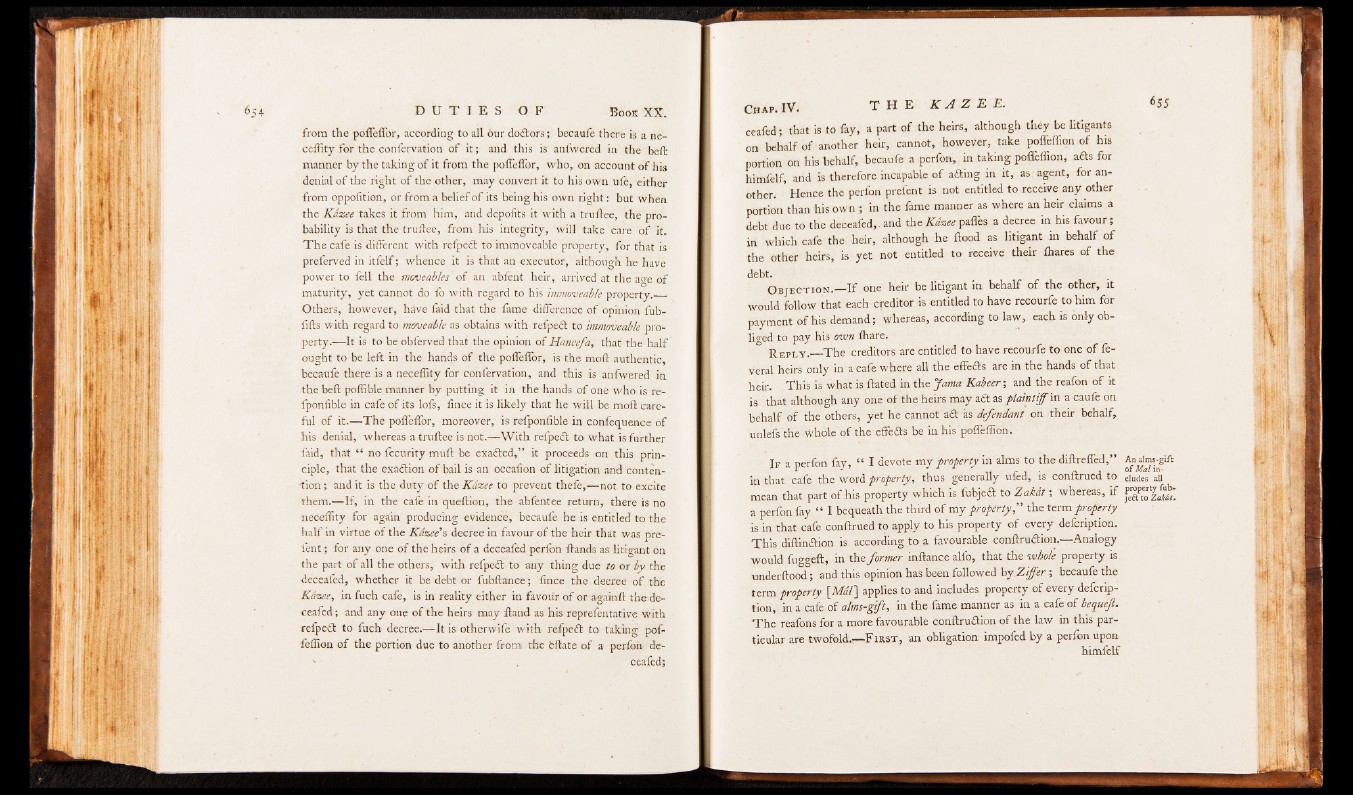
from the poffeffor, according to all our doctors; becaufe there is a ne-
ceffity for the confervation of i t ; and this is anfwered in the bed:
manner by the taking of it from the poffeffor, who, on account of his
denial of the right of the other, may convert it to his own ufe, either
from oppofition, or from a belief of its being his own right: but when
the Kdzee takes it from him, and depofits it with a truftee, the probability
is that the truftee, from his integrity, will take care of it.
T h e cafe is different with refped to immoveable property, for that is
preferved in itfelf; whence it is that an executor, although he have
power to fell the moveables of an abfent heir, arrived at the age of
maturity, yet cannot do lo with regard to his immoveable property.__
Others, however, have faid that the fame difference of opinion fub-
fifts with regard to moveable as obtains with refped to immoveable property
.•— It is to be obferved that the opinion of Haneefa, that the half
ought to be left in the hands of the poffeffor, is the mod authentic,
becaufe there is a neceffity for confervation, and this is anfwered in
the bed poffible manner by putting it in the hands of one who is re-
fponfible in cafe of its lofs, fince it is likely that he will be mod careful
of it.— The poffeflor, moreover, is refponfible in confequence of
his denial, whereas a truftee is not.— With refped to what is further
laid, that “ no fecurity mud be exaded,” it proceeds on this principle,
that the exaction of bail is an occalion of litigation and contention
; and it is the duty of the Kdzee to prevent thefe,— not to excite
them.— If, in the cafe in queftion, the abfentee return, there is no
neceffity for again producing evidence, becaufe he is entitled to the
half in virtue of the Kdzee's decree in favour o f the heir that was pre-
fent; for any one of the heirs of a deceafed perfen ftands as litigant on
the part of all the others, with refped to any thing due to or by the
deceafed, whether it be debt or fubftance; fince the decree of the
Kdzee, in fuch cafe, is in reality either in favour of or againd the deceafed
; and any one of the heirs may ftand as his reprefentatiye with
refped to fuch decree.— It is otherwife with refped to taking pof-
feffion of the portion due to another from the feftate of a perfon de-
' . ceafed;
ceafed; that is to fay, a part of the heirs, although they be litigants
on behalf of another heir, cannot, however, take poffeffion of his
portion on his behalf, becaufe a perfon, in taking poffeffion, ads for
himfelf, and is therefore incapable of aiding in it, as agent, for another.
Hence the perfon prefent is not entitled to receive any other
portion than his own ; in the fame manner as where an heir claims a
debt due to the deceafed, and the Kdzee pafles a decree in his favour;
in which cafe the heir, although he flood as litigant in behalf o f
the other heirs, is yet not entitled to receive their lhares of the
debt.
O bjection.— I f one heir be litigant in behalf of the other, it
would follow that each creditor is entitled to have recourfe to him for
payment of his demand; whereas, according to law, each is only obliged
to pay his own ffiare.
r e p ly ._The creditors are entitled to have recourfe to one o f feveral
heirs only in a cafe where all the effeds are in the hands of that
heir. This is what is dated in the Jama Kabeer; and the reafon of it
is that although any one of the heirs may ad as plaintiff in a caufe on
behalf of the others, yet he cannot ad as’ defendant on their behalf,
unlefs the Whole of the effeds be in his poffeffion.
I f a perfon fay, “ I devote my property in alms to the diftreffed,” A n ^m s -g if t
in that cafe the word property, thus generally ufed, is conftrued to eludes all
mean that part of his property which is fubjed to Z a kd t; whereas, if
a perfon fay “ I bequeath the third of my property," the term property
is in that cafe conftrued to apply to his property of every defcription.
This diftindion is according to a favourable conftrudion.— Analogy
would fuggeft, in the former inftance alfo, that the whole property is
underftood; and this opinion has been followed byZ f f e r ; becaufe the
term property \fbulj applies to and includes property of eveiy deferip-
tion, in a cafe of alms-gift, in the fame manner as in a cafe of bequeft.
T h e reafons for a more favourable conftrudion of the law in this particular
are twofold.— F i r s t , an obligation impofed by a perfon upon
himfelf